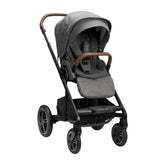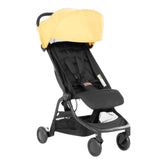Extreme Worry After Baby's Born? It May Be Postpartum Anxiety

Postpartum anxiety is when an individual undergoes a period of extreme stress and tension after childbirth or becoming a parent. This anxiety often reaches levels beyond their ability to control and consumes their thoughts. While some degree of stress is normal and even predictable after having a baby, a person experiencing postpartum anxiety may be completely overwhelmed with constant irrational fear and excessive worry. The anxiety may have a specific trigger or may feel rather general and ambiguous. Research indicates postpartum anxiety is a common condition, affecting somewhere between 11% and 21% of people designated female at birth.
Postpartum Anxiety vs. Postpartum Depression: What’s the Difference?
Postpartum depression and anxiety may occur simultaneously. While they have a number of symptoms in common, it should be noted they are different conditions. With postpartum depression, you may feel extreme sadness, cry often, or feel that you’re unable to care for your infant or yourself. Postpartum anxiety, on the other hand, is characterized by a disproportionate amount of worry as opposed to sadness. If you’re suffering from constant panic or frequently feeling overcome with fear, you might be experiencing postpartum anxiety. A number of the symptoms of postpartum anxiety can coincide with postpartum depression, such as trouble sleeping and increased heart rate. Many (but not all) people experience both.
Postpartum Anxiety Signs and Symptoms
When your body believes there is danger or a threat, you experience anxiety. With postpartum anxiety, your body is responding to the feeling that both you and your infant are in ongoing danger. According to the Cleveland Clinic, postpartum anxiety symptoms commonly include the following:
Physical signs
- Difficulty sleeping
- Heart palpitations
- Upset stomach
- Shortness of breath
- Loss of appetite
- Difficulty sitting still or feeling fidgety
- Muscle tension
Emotional signs
- Inability to relax or keep calm
- Obsessive thinking, particularly regarding worst-case outcomes
- Feeling constantly on edge or plagued by excessive worry or panic
- Inability to concentrate
- Crankiness
Behavioral signs
- Staying away from specific activities, individuals, or locations
- Being overly careful and guarded even in seemingly safe situations
- Compulsively and repeatedly inspecting things
- Being controlling

What Causes Postpartum Anxiety?
The truth is there are a lot of things that can make a new parent experience high levels of anxiety, especially with the first baby. Raging hormone levels certainly contribute to the problem. However, why some people experience postpartum anxiety disorder and others don’t is a bit unclear. If you experienced high anxiety or obsessive-compulsive disorder prior to pregnancy or have a family history of either condition, your risk may be higher. A history of disordered eating, a previous miscarriage or infant death, or a history of extreme mood swings associated with your menstrual cycle may also increase your risk.
How Is Postpartum Anxiety Diagnosed?
The most important step in recovering from postpartum anxiety is getting diagnosed by your healthcare provider. Talk to your doctor honestly and openly about what you’re experiencing. There is no shame in what you’re going through. Be sure to go to your postpartum check-up with your healthcare provider, typically within the first 6 weeks after delivery. You can — and should — also schedule a follow-up appointment any time you have troublesome symptoms.
Postpartum Anxiety Treatment Options
Your doctor may ask questions or use other screening tools to diagnose you. They can then advise proper treatment based on the severity of your symptoms, your health history, and whether or not you’re nursing. In some instances, modifications to your daily routine or talking with a therapist can help improve symptoms. If your anxiety deepens or is hindering your daily activities, pharmaceutical treatment may be an option.
How Long Can Postpartum Anxiety Last?
Postpartum anxiety doesn't last indefinitely, but it also doesn't normally dissipate by itself. Receiving quick treatment from your healthcare provider is the best way to heal. Remember, postpartum anxiety is not your fault. Don’t let the social stigma associated with anxiety stop you from getting help. The healthiest thing you can do for both you and your baby is to seek help from a medical professional. Finding a group of trusted friends or family members who can assist with your new parenting duties may also help.

Postpartum Anxiety Prevention: Is It Possible?
There’s really little you can do to prevent or reduce your risk for postpartum anxiety. It’s not caused by any action or inaction on your part. If you feel there may be certain events from your past (like a pregnancy loss) that could influence your stress levels or if you have a history of anxiety or depression, talk to a therapist while you’re pregnant. They can begin teaching you ways to manage the intensity of your stress and give you tools for how to handle excessive worry before your little one arrives.
When to Call the Doctor About Postpartum Anxiety: Red Flags
If you feel you may be suffering from postpartum anxiety, it’s important to call your healthcare provider as soon as possible. A few distinct symptoms to keep an eye out for are:
- Experiencing constant, unending worry
- Feeling like you aren’t really connecting with your infant
- Experiencing symptoms of postpartum depression
- Feeling completely overcome by your daily responsibilities
- Feeling like your anxiety is deepening (worrying about worrying)
If you need immediate help or have thoughts of hurting yourself or your baby, contact the National Suicide Prevention Hotline at 988.
The Takeaway on Postpartum Anxiety
Adapting to life with an infant can be difficult. Anxiety is normal and expected with a new baby in the house. For some individuals, though, the worry can become all-consuming and excessive, resulting in changes to their behavior and their health. Understand that postpartum anxiety is incredibly common, and most importantly, it’s not your fault. Speak with your healthcare provider about what you’re experiencing. Treatment is available, and you don’t have to suffer in silence.









